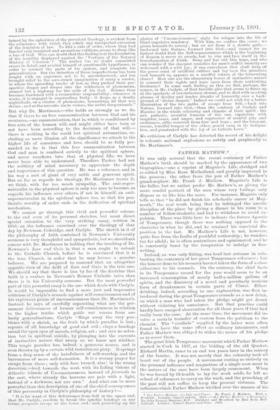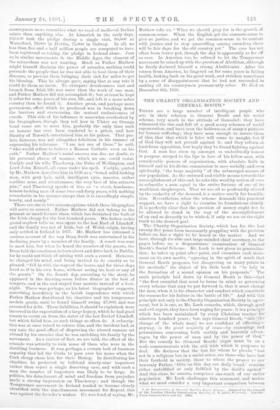FATHER MATHEW.*
IT was only natural that the recent centenary of Father Mathew's birth should be marked by the appearance of two biographies,—one a reprint of Maguire's Life, abridged and re-edited by Miss Rosa Mulholland, and greatly improved in the process ; the other from the pen of Father Mathew's grand-nephew, Mr. Frank J. Mathew. Maguire's Life is the fuller, but we rather prefer Mr. Mathew's, as giving the more candid portrait of the man whose very failings only dispose us to like him the more. For instance, Maguire only tells us that "he did not finish his scholastic career at May- nooth," the real truth being that he infringed the ascetic discipline of the place by giving a dinner in his room to a number of fellow-students, and had to withdraw to avoid ex- pulsion. There was little here to indicate the future Apostle of Temperance, though there was nothing opposed to the character in what he did, and he retained his convivial dis- position to the last. Mr. Mathew's Life is not, however, quite free from the faults of youthful authorship ; he wandera too far afield ; he is often sententious and opinionated, and he is constantly beset by the temptation to indulge in fine- writing.
Ireland, as was only fitting, was loud last autumn in cele- brating the centenary of her great Temperance reformer ; but the honour done to his memory has not taken the form of a close adherence to his counsels. On the contrary, the chief facts in its Temperance record for the year would seem to be an increased consumption of nearly half-a-million gallons of spirits, and the discovery of a novel and peculiarly noxious form of drunkenness in certain parts of Ulster. Ether- drinking, indeed, according to one explanation, was first in- troduced during the great Temperance crusade as a new drink, on which a man who had taken the pledge might get drunk without violating his conscience. But that practice could hardly have escaped observation for all these years if that had really been the case, At the same time, the movement did in- volve a certain transfer of custom from the publican to the chemist. The "cordials" supplied by the latter were often found to have the same effect as ordinary intoxicants, and Father Mathew was obliged to widen the terms of his pledge as to cover them.
The great Irish Temperance movement which Father Mathew started in Cork in 1837, at the bidding of the old Quaker, Richard Martin, came to an end ten years later in the misery of the famine. It was not merely that the calamity took all heart out of the people. A movement resting so entirely on the personal influence and magnetism of a single man must in the nature of the case have been largely evanescent. When he was forced by ill-health to lay the work aside, he left no school of reformers to carry on the work, and the preaching of the past will not suffice to keep the present. virtuous. The influence which Father Mathew wielded over the masses of his
(1.) Father Mathews his Life an I Tunes. By Frank S. Mathew. With a Portrait. London : Cassell and CO. 18)1—(2.) Father Ms heses a Biography. By John Frei:cis Maguire, M.P. Abridged and Re•eciited by Kim R'34I4 Mut- h:Aland. Landon: Baxter end SOIIP. 1835.
countrymen more resembles what we read of mediaeval Italian saints than anything else. At Limerick in the early days, 150,000 took the pledge during a single visit, 80,000 at Waterford, 70,000 in Dublin, 75,000 in Galway. In all, no less than five and a half million people are computed to have been registered as taking the pledge in Ireland alone. Just as in similar movements in the Middle Ages, the element of the miraculous was not wanting, Much as Father Mathew might himself disclaim the power of miracles, nothing could persuade the people that he was not able to heal them of their diseases, or prevent thenibringing their sick for miles to get his blessing. This he always gave, saying that at. any rate it could do them no harm. To extirpate drunkenness root and branch from Irish life was more than the work of one man, and Father Mathew did not accomplish it ; but at least he kept it sober for some years of his own life, and left it a more sober country than he found it. Another great, and perhaps more permanent, effect which he produced was in breaking down the barriers and overcoming the mutual exclusiveness of creeds. This side of his influence is somewhat overlooked by his biographers, though they tell how in Ulster an Orange baud came out to meet him, probably the only time such an honour has ever been rendered to a priest, and how Stanley of Norwich entertained him at his palace. That pre- late, however, was not altogether felicitous in his manner of expressing his tolerance. "I am not one of those," he said, "who would refuse to believe a Roman Catholic even on his oath." Father Mathew's social success was due, no doubt, to hie personal charm of manner, which no one could resist. Carlyle and his wife, Thackeray, the Duke of Wellington, and Lord John Russell, all came under his spell. Carlyle, quoted by Mr. Mathew, describes him in 1838 as a "broad, solid-looking man, with grey hair, mild, intelligent eyes, massive, rather aquiline nose, and countenance, the very face of him attracts you;" and Thackeray speaks of him as "a stout, handsome, honest-looking man of some two-and-forty years, with nothing remarkable in his manner except that it is exceedingly simple, hearty, and manly."
There are one or two misconceptions which these biographies will serve to correct. Father Mathew did not belong to the peasant or small-farmer class, which has furnished the bulk of the Irish clergy for the last hundred years. His father, so his grand-nephew tells us. was agent to the last Earl of Llandaff, and the family was not of Irish, but of Welsh origin, having only settled in Ireland in 1637, Mr. Mathew has exhumed a curious account of the way Dean Swift was entertained in his declining years by a member of the family. A coach was sent to meet him, but when he heard the number of the guests, the Dean told the coachman to turn about and drive back to Dublin, for he could not think of mixing with such a crowd. However, he changed his mind, and being invited to do exactly as he pleased, "fell in with, the ways of the house, and for three days lived as if in his own home, 'without seeing his host or any of the guests." On the fourth day, according to the story, he appeared in the drawing-room before dinner in the best of tempers, and in the end stayed four months instead of a fort- night. There was perhaps, as his latest biographer suggests, something hereditary in the lavish imprudence with which Father Mathew distributed his charities and his temperance medals gratis, until he found himself owing £7,000, and was arrested for debt. These liabilities, it should be explained, were incurred in the expectation of a large legacy, which he had good reason to count on, from the sister of the last Earl of Llandaff, but which failed him, as such things so often do. A subscrip- tion was at once raised to release him, and the incident had, at any rate, the good effect of disproving the absurd rumour set abroad by his enemies that he was enriching his family by the movement. As a matter of fact, we are told, the effect of the crusade was actually to ruin some of them who were in the distilling business. It was, perhaps, a certain lack of business Capacity that led the Curia to pass over his name when the Cork clergy chose him for their Bishop. In distributing his charities, he preferred to befriend ninety-nine impostors rather than reject a single deserving case, and with such a man the number of impostors was likely to be large. In politics, his detachment of mind and freedom from prejudice made a strong impression on Thackeray ; and though the Temperance movement in Ireland tended to become closely Identified with the simultaneous movement for Repeal, this was against the founder' s wishes. Ire was fond of saying, Mr. Mathew tells us, "What we should pray for is the growth of common-sense. When the English get the common-sense to give us justice, and we get the common-sense to be content with justice and to stop quarrelling among ourselves, there will be fair days for the old country yet." The case has not often been better put, though the day is apparently as far off as ever. In America, too, he refused to let the Temperance movement be mixed up with the question of Abolition, although he freely declared himself a strong Abolitionist. After his return from America, he lingered on for some years in failing health, looking back on his great work, and stricken sometimes by a sense of disappointment that he had not succeeded in making all his countrymen permanently sober. He died on December 8th, 1856.







































 Previous page
Previous page